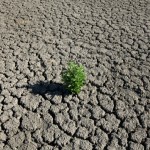Why Fewer Fishing Licenses Could Mean Fewer Fish for Texas

Photo credit should read PAUL J.RICHARDS/AFP/Getty Images
With fishing license sales down, budgets to stock rivers and lakes are being stretched thin.
David Barer, an intern at StateImpact Texas, researched and reported this article.
Derrick Schmalz is lifetime angler who grew up fishing on the Llano River with his grandfather. When it comes to fishing in his home state, he can’t help but show a little Texas pride.
“I’ve fished all over the country, and Texas has one of the best license programs in the nation,” said Schmalz. “Buying a fishing license is a small price to pay to go fishing and enjoy so many of the great resources the state has to offer.”
Schmalz and anglers like him owe some of the pleasure they take from hours on the water to state programs that stock fish in Texas lakes and rivers. But funding for those programs, like the rest of Texas Parks and Wildlife budget, is drying up at an alarming rate.
Sales of fishing licenses are the most important income for the state fish hatcheries, and sales in 2011 were down compared to previous years.
“A factor may be the economic situation we are all facing … if [anglers] have a choice to make with available resources, a fishing license might not be there,” Todd Engeling, Chief of Inland Hatcheries at the Texas Parks and Wildlife Department (TPWD), told StateImpact Texas.
But if the economy is partly to blame, TPWD says last year’s drought, record breaking-heat and deadly wildfires have also also taken their toll. All told, the Department was struggling with a 4.6 million dollar budget deficit by late last year, when it launched a PR campaign trying to lure absent campers, hikers, hunters and anglers back into the wild.
And when it comes to fishing, lower lake levels pose a special threat.
The drought lowered lake levels across the state, rendering many boat ramps inaccessible. Anglers who can’t get a fishing boat into their favorite lakes are less likely to buy a license, and much of the state is still in desperate need of rain. Even during this uncommonly wet winter, the ends of boat ramps at Lake Travis and Lake Buchanan still sit twenty or more feet from the water’s edge.
The hatcheries department stocks a variety of sport fish, the most popular large and smallmouth bass, striped bass, catfish, and rainbow trout. If stocking stopped, some species — like catfish and bass — could survive and spawn new generations. Others, like striped bass and trout, would die out.
That could make for even fewer anglers buying licenses which would mean even less funding for stocking programs.
And for Angler Derrick Schmalz, that could end up having an effect on more than just the fishing.
“The better our fish-stocking program is, the more people will enjoy fishing and spending time in nature.” said Schmalz. “That time spent in nature will promote conservation and preserving the environment.”

